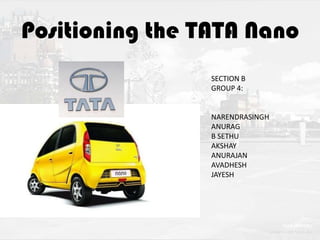Positioning of TATA Nano
- 1. Positioning the TATA Nano SECTION B GROUP 4: NARENDRASINGH ANURAG B SETHU AKSHAY ANURAJAN AVADHESH JAYESH
- 2. Case Overview • In 2009, launch of Nano from TML • Problem in front of Ratan Tata - How best to position his new brand – ultra low cost cars • Option One – Family transport • Option Two – Usage situation • Which option to choose ?
- 3. The TATA Group : Company History • Founded by Jamsetji Tata in 1868 as trading company • First steel mill, power utility, luxury hotel and international airline • By 2011, 98 companies over 7 sectors. • Company seen as Inspired trust & a strong commitment to ethics • By TATA Code of Conduct, TATA promised to improve the quality of life and Nano is a prime example.
- 4. The automotive industry in india • Automobile industry flourished with an average growth rate of 17 percent annually post liberaliszation • In 2009 industry produced more than 11 million vehichles
- 5. • Despite growth, per capita ownership of automobile is low compared to developed countries • Estimated 12 car owners per 1000 people, versus 765 per 1000 in US and 426 per 1000 in UK • Two wheelers dominate Indian market due to fuel efficiency , low purchase, and low maintenance cost • About 76 % of all vehicle sales in India are of 2 wheelers and remaining are passenger vehicle
- 6. Segmentation of passenger vehicle Segment Description Price range A Entry level hatchback (ex- Alto , maruti 800) Under 3.5 lakhs B1 Hatchback (ex - Tata indica) 3.5 to 6 lakhs B2 Hatchback 6 to 7.5 lakhs C1 Sedan Under 8 lakhs C2 Sedan 8 to 9.5 lakhs D1 Premium sedan Under 15 lakhs D2 Luxuty sedan Under 25 lakhs
- 7. THE NANO • 2007 Geneva auto show - “world’s smallest and cheapest car” and most fuel-efficient which would be known as “ people’s car” at Rs. 1 lakh price. • • 3 models : The Nano, The Nano CX and The Nano LX The development of the NANO’s engine i.e. two cylinder 624 cc ,was left to Tata motors • • To reduce the costs associated with parts and manufacturing without compromising quality, Tata partnered with different suppliers including GKN Driveline India (driveshaft) The Nano met Rest. 1 lakh goal by omitting many features like power steering, power window, ac etc. Whereas The Nano CX and The Nano LX offered more luxurious car at higher price
- 8. • First year, TML planned to produce 3,50,000 Nanos at a plant being built at Singur, WB. • Conflict at Singur • In September 2008, shift to Sanand, Gujarat – with delay in production of 18 to 24 months. • By not postponing the much anticipated launch, TML started to produce 50,000 Nanos temporarily at Pantnagar plant, Uttarakhand.
- 9. Competition • Maruti 800 : most affordable car in India until the release of Nano • Current major competitor : Maruti Alto • Future competition : ULC cars from Hyundai, Maruti, Habib Motors, Renault Nissan, Toyota and Ford • Two wheeler segment – low price, fuel efficiency, easy maneuverability, low maintenance cost compared to Nano • Consumer behavior – more value for money slightly more cost, but better engine, safety features and more space – Wagon R, Santro Xing, Chevrolet Beat, Alto etc
- 10. Distribution Channels • A 17-day booking window, of which customers would be selected via lottery • Booking options : Online booking Tata Dealership Offline booking at SBI branches and various Tata stores • Deposit payment must
- 11. • Dealerships 214 dealerships across 28 states Dealer margins cut down from 4-10 % to 2-3% 1% discount if dealer paid cash upfront • Toyed with the idea of using entrepreneurial engineers as local retailers • Idea scrapped due to potential warranty and liability issues.
- 13. 2009 • In April 2009, out of the initial bookings of 2,03,000 Nanos, 1,00,000 were selected using lottery system • Half bookings were for Nano LX, 30% for Nano CX and 20% for the basic Nano • The new Sanand plant provided a capacity of 2,50,000 units per year • Open Sales through Tata Dealerships began from a single state in 2009
- 14. 2010 onwards.. • Monthly sales grew peaking at 9,000 units per month in July 2010 • In November 2010, when the car sales grew 22%, sales of Nano plummeted to a mere 509 units • This was due to two causes: – Rising safety issues – Rising raw material costs
- 18. Fire fighting • Tata motors conducted an investigation. TML issued a statement that the fires were a result of “foreign electrical equipment” and not due to any safety issues in car • TML took measures and improved the electrical system of the car • TML also increased the 18 months warranty to 4 years or 60,000 Kms • By December, the sales rebounded to 5,784 units
- 28. Thank you

